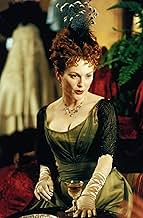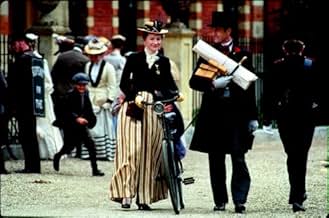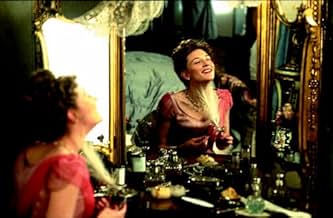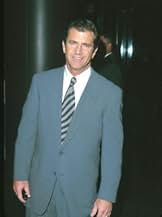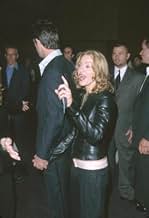NOTE IMDb
6,8/10
17 k
MA NOTE
Ajouter une intrigue dans votre langueLondon 1895: Cabinet minister, Sir Chiltern, and bachelor, Lord Goring, are victims of scheming women.London 1895: Cabinet minister, Sir Chiltern, and bachelor, Lord Goring, are victims of scheming women.London 1895: Cabinet minister, Sir Chiltern, and bachelor, Lord Goring, are victims of scheming women.
- Réalisation
- Scénario
- Casting principal
- Nomination aux 3 BAFTA Awards
- 4 victoires et 17 nominations au total
Avis à la une
One of the principal sources of humour in Wilde's plays comes from pricking at the inflated egos, pious humbug and ignorance of the upper classes. There is always a Wildean character to reverse a clicheed expression or invert conventional 'wisdom.' Unfortunately, by stripping most of his characters of their stiff formality and rigid social code, the writer and director have removed the butt of the joke and Wilde's comments on absurdity are left without a punchline. The attempt to work in anachronistic social relevance leaves us with a set of feeble characters who fall in love with each other for no obvious reason. Because Wilde's language has been sterilised the actors have to use mugging to express the personalities Wilde created. Result, a charmless and dated 'political' drama as credible as a Jeffery Archer novel. Gertrude is insecure and fretful where she should be smug and priggish- Mabel is arch where she should be caustic- Poor Oscar - gets no 'Oscar'!
One of good adaptations. For performances - Rupert Everett as the inspired choice for each "translation" of Oscar Wilde universe - but, in same measure, for a sort of freshness of a case of inspired use of the nuances of Wilde humor. A film about a man and his secrets and the prices of confidence. Seductive. And simple. And, maybe, lovely.
It's quite a long time that i haven't seen such a perfect movie: a highly talented cast, a lavishing setting and a finely chiseled and powerful script.
Here, you got an all-star team: Driver as the eccentric but romantic young woman (unfortunately a falling star that hasn't shine for a long time), Moore as the Machiavellian lonely woman, Everett as the helpful friend, "Sir Robert" as the courageous man and ... Blanchet as the lovely wife whom characterization deeply moved me. In my tumultuous life, i was just wondering what's the special gift a woman can offer (me) to fall in love: beauty, wit, sensuality, wealth, power? Gertrude has nothing of that but her kindness, her attention, her devotion left me under the spell. She could become easily my ideal wife.
Then, the story happens in the Victorian time for which i have also a strong tie. I just really appreciate the British phlegm: you can say the more vile things but always with class. Here, you find cupidity, blackmail, lies, ambition but there's nor a fight nor a shout!
At last, the script is really well written: you don't know if this is a romance, a buddy movie, a thriller or a tragedy. I really like the morals questions the movie asks: can a bad action be redeemed? How can a true friend be helpful? Does love live with lies? The answers are not brought in a dull, academic patronizing way but playfully because all the characters seems to orbit around each other!
In conclusion, it's a sort of lighter and happier "Carlito's way" thus a great movie that is maybe really unknown.
Here, you got an all-star team: Driver as the eccentric but romantic young woman (unfortunately a falling star that hasn't shine for a long time), Moore as the Machiavellian lonely woman, Everett as the helpful friend, "Sir Robert" as the courageous man and ... Blanchet as the lovely wife whom characterization deeply moved me. In my tumultuous life, i was just wondering what's the special gift a woman can offer (me) to fall in love: beauty, wit, sensuality, wealth, power? Gertrude has nothing of that but her kindness, her attention, her devotion left me under the spell. She could become easily my ideal wife.
Then, the story happens in the Victorian time for which i have also a strong tie. I just really appreciate the British phlegm: you can say the more vile things but always with class. Here, you find cupidity, blackmail, lies, ambition but there's nor a fight nor a shout!
At last, the script is really well written: you don't know if this is a romance, a buddy movie, a thriller or a tragedy. I really like the morals questions the movie asks: can a bad action be redeemed? How can a true friend be helpful? Does love live with lies? The answers are not brought in a dull, academic patronizing way but playfully because all the characters seems to orbit around each other!
In conclusion, it's a sort of lighter and happier "Carlito's way" thus a great movie that is maybe really unknown.
If I weren't so lazy, I would have checked the original play to see if my favorite line from the movie was in it:
Goring's father: I use nothing but my common sense. Goring: So my mother tells me.
Even if was concocted for the film, that line still contains the essence of Wilde and the essence of all modern British humor, for which, I should say, I'm a major sucker. While watching An Ideal Husband, I didn't object to the lack of suspense as long as Rupert Everett was working his way around those Wilde lines, which he does as well as anyone I've ever heard.
I used to think Stephen Fry was Wilde on earth, but Fry is something wonderfully different -- Everett is Wilde on earth, or at least the actor that Wilde should have had around to deliver those lines when he wrote them. I first saw Everett in The Madness of King George, for which he put on weight. Every review of that film mentioned this; I thought the attention excessive, but when I saw him lying shirtless in a sauna, I understood. The man is, shall we say, cut. I can only imagine the effect of that scene on straight women or gay men -- probably something akin to the effect Greta Scacchi's "I think we're alone now" smile at the end of The Coca-Cola Kid has on me.
An Ideal Husband is full of good performances, with one glaring exception: the usually great Julianne Moore. Her scenes are curiously leaden, and Parker -- whose fault this may be -- has the camera linger over her as though the exposure will convince us how evil she is. The one exception is her scene with Everett, which has a real "Will he sleep with the enemy?" tension. It may be that Moore was just outclassed by the Brits, who are born to this stuff.
Cate Blanchett, whom I've seen in three movies, two of which were British period pieces, continues to amaze me with her range.
The unsung hero of the movie is Jeremy Northam, who takes a thankless role -- the man in the play who isn't the Oscar Wilde figure -- and makes it emotionally compelling. He is responsible for the play's only real suspense and emotion, since the rest is word games, more or less.
All of which leads me to blame the production's shortcomings on its writer/director, Oliver Parker. He seems to have squandered an outstanding cast. The play's final scene is played as a series of French scenes -- a film term for a series of different scenes in the same location -- and this kills any momentum that scene might have had.
Three out of four stars, I say, which makes it better than 90% of the movies out there.
Goring's father: I use nothing but my common sense. Goring: So my mother tells me.
Even if was concocted for the film, that line still contains the essence of Wilde and the essence of all modern British humor, for which, I should say, I'm a major sucker. While watching An Ideal Husband, I didn't object to the lack of suspense as long as Rupert Everett was working his way around those Wilde lines, which he does as well as anyone I've ever heard.
I used to think Stephen Fry was Wilde on earth, but Fry is something wonderfully different -- Everett is Wilde on earth, or at least the actor that Wilde should have had around to deliver those lines when he wrote them. I first saw Everett in The Madness of King George, for which he put on weight. Every review of that film mentioned this; I thought the attention excessive, but when I saw him lying shirtless in a sauna, I understood. The man is, shall we say, cut. I can only imagine the effect of that scene on straight women or gay men -- probably something akin to the effect Greta Scacchi's "I think we're alone now" smile at the end of The Coca-Cola Kid has on me.
An Ideal Husband is full of good performances, with one glaring exception: the usually great Julianne Moore. Her scenes are curiously leaden, and Parker -- whose fault this may be -- has the camera linger over her as though the exposure will convince us how evil she is. The one exception is her scene with Everett, which has a real "Will he sleep with the enemy?" tension. It may be that Moore was just outclassed by the Brits, who are born to this stuff.
Cate Blanchett, whom I've seen in three movies, two of which were British period pieces, continues to amaze me with her range.
The unsung hero of the movie is Jeremy Northam, who takes a thankless role -- the man in the play who isn't the Oscar Wilde figure -- and makes it emotionally compelling. He is responsible for the play's only real suspense and emotion, since the rest is word games, more or less.
All of which leads me to blame the production's shortcomings on its writer/director, Oliver Parker. He seems to have squandered an outstanding cast. The play's final scene is played as a series of French scenes -- a film term for a series of different scenes in the same location -- and this kills any momentum that scene might have had.
Three out of four stars, I say, which makes it better than 90% of the movies out there.
Gertrude (Cate Blanchett) is an English aristocrat in the Edwardian era. She is very much in love with her husband, Robert (Jeremy Northam), a rising star in the British Parliament. Yet, an old schoolmate of Gertrude's, the conniving Laura (Julianne Moore) arrives back in town with a mission. She knows a secret about Robert that would bring about his ruin and decides to pressure him to support a government bill that would invest heavily in a Argentine adventure, one she has staked her money on as well. What can Robert do? He turns to a close friend, Lord Arthur (Rupert Everett) for help. Arthur, a rich and witty bachelor, offers what support he can. But, with women chasing him around every corner, including Robert's sister, Mabel (Minnie Driver), can Arthur devote the time required to saving his friend? And, will Gertrude have to be told about the blackmailing, causing her to lose some faith in the husband she thinks is "ideal"? This film, based on a play by Oscar Wilde, is a sophisticated and charming movie of the highest order. As such, it is replete with clever and mirthful lines, lovely costumes, beautiful sets, and memorable characters. As the principal actors, Blanchett, Northam, Everett, Driver, and Moore are excellence itself, laying doubt that anyone else could have filled their roles in a better manner. Yes, it is a dialogue-driven film but it is never stuffy or boring. If you have enjoyed such movies as Emma or A Merry War, this one is an ideal choice for your next film engagement. But, even if you are channel surfing and stumble across the flick on some lonely night, you will be drawn to its universal humor and humanity.
Le saviez-vous
- AnecdotesWhen Mrs. Chevely discovers Gertrude's letter, it is laying atop a yellow book with an Aubrey Beardsley illustration on the cover. This is apparently a copy of The Yellow Book, which was a Victorian magazine of sorts. When Oscar Wilde was arrested on charges of sodomy in 1895, he was carrying what appeared to be The Yellow Book, and because of this association, the publication was ruined.
- GaffesAt the reception at the Chiltern's home, Sir Robert is requested to meet the Indian Ambassador. In 1895 India was a British possession and there could not be such an Ambassador who represents only independent states.
- Citations
Lord Caversham: What are you doing here, sir? Wasting your time, as usual?
Lord Arthur Goring: My dear father, when one pays a visit, it is for the purpose of wasting other people's time and not one's own.
- Crédits fousThe credits list Oliver Parker, the director, as playing "Bunbury", one of the gentlemen that is seen playing cards with Lord Goring in the Men's Club when Lord Chiltern arrives. Bunbury is also a never-seen character in "The Importance of Being Earnest", the play which is performed in the background of several scenes of this film.
Meilleurs choix
Connectez-vous pour évaluer et suivre la liste de favoris afin de recevoir des recommandations personnalisées
- How long is An Ideal Husband?Alimenté par Alexa
Détails
- Date de sortie
- Pays d’origine
- Site officiel
- Langue
- Aussi connu sous le nom de
- An Ideal Husband
- Lieux de tournage
- Sociétés de production
- Voir plus de crédits d'entreprise sur IMDbPro
Box-office
- Budget
- 14 000 000 $US (estimé)
- Montant brut aux États-Unis et au Canada
- 18 542 974 $US
- Week-end de sortie aux États-Unis et au Canada
- 192 802 $US
- 20 juin 1999
- Montant brut mondial
- 18 542 974 $US
- Durée1 heure 37 minutes
- Mixage
- Rapport de forme
- 1.85 : 1
Contribuer à cette page
Suggérer une modification ou ajouter du contenu manquant

Lacune principale
By what name was Un mari idéal (1999) officially released in India in English?
Répondre

